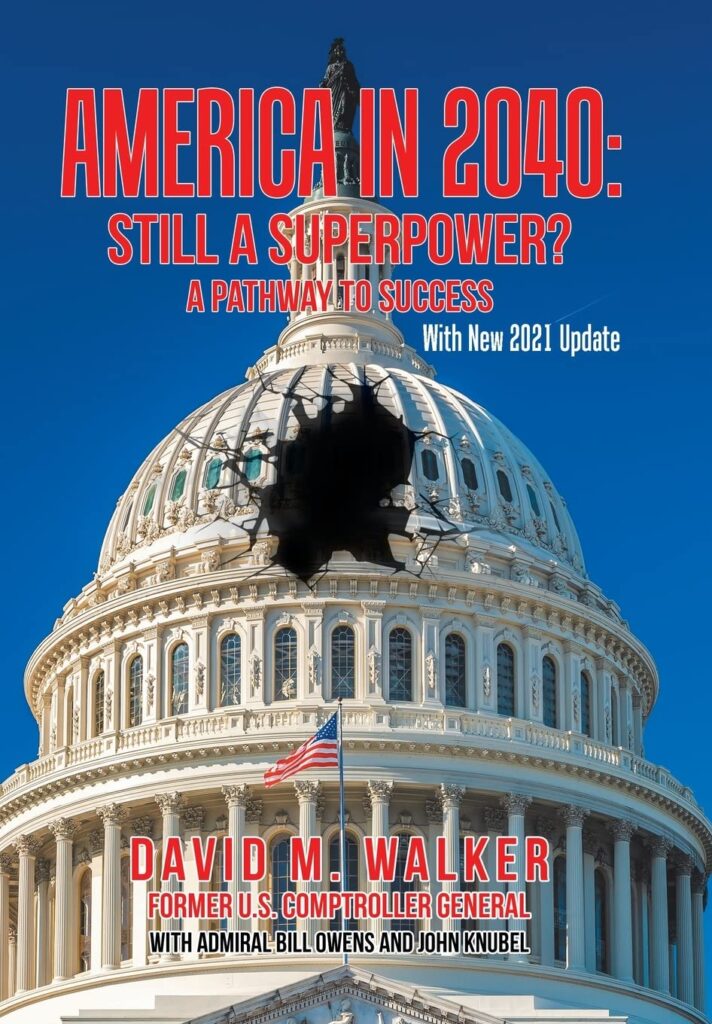
The federal government has grown too big, promised too much, subsidized too many, lost control of the budget, and has not managed to achieve real outcome-based results for the American people. As a result, it has accumulated almost $35 trillion in debt, but this is just the tip of the iceberg. When you add other liabilities and unfunded social insurance obligations, the total federal financial sinkhole is over $125 trillion and growing faster than the economy. Unbelievably, we now spend more on interest than defense, and interest is now our fastest-growing expense for which we get nothing!
If the above does not scare you, the future projections by the Congressional Budget Office (CBO) should. CBO projects annual deficits will average about $2 trillion for the next 10 years under current law and that is based on optimistic assumptions. The federal government also projects that the Social Security retirement Trust Fund will become exhausted in about nine years. If that happens, Social Security benefits will be immediately cut by about 20% for tens of millions of retirees.
Americans are now realizing how excessive spending and loose money policies result in increased inflation, higher interest rates, and reduced real wages. They are not happy and want something done about it.
When you add other liabilities and unfunded social insurance obligations, the total federal financial sinkhole is over $125 trillion and growing faster than the economy.
Despite the above, the current major Presidential candidates and top Congressional leaders are providing no real leadership to address the large, known, and growing federal debt bomb that threatens our future economic and national security, international standing, and domestic tranquility. It is clear that the biggest deficit in Washington is a leadership deficit!
The last President who was fiscally responsible was Bill Clinton. He used the bully pulpit and worked on a bipartisan basis to make needed fiscal reforms become a reality. The result was four years of budget surpluses and two years where debt held by the public was reduced. In addition to getting a President who will use the bully pulpit and lead on this issue, the following three steps are essential to restore fiscal sanity and sustainability.
First, Congress needs to pass, and the President needs to sign the House Fiscal Commission Act. This Act would create a bipartisan commission that would actively engage the American people and make a package of recommendations to Congress for an up or down vote. Everything would be “on the table” but not everything is equal. The most likely result is to adopt pro-growth policies, reduce prospective spending, and raise future revenues that will reduce public debt/GDP to a reasonable and sustainable level by a future year certain. The public recognizes that excessive spending is the primary problem, but the public also understands that additional revenues will be needed to restore fiscal sanity and sustainability. Representative groups of voters have supported a 3:1 ratio of prospective spending reductions, including interest, to revenue increases.
Second, the debt ceiling has failed to constrain the growth of government and prevent mounting debt burdens. The only thing that can constrain current and future Congresses is a Constitutional amendment that will limit how much public debt/GDP the federal government can take on absent extremely limited and extraordinary circumstances (e.g., a formal declaration of war). If Congress will not propose such an amendment, the states should through a Convention of States under Article V of the Constitution.
Unbelievably, we now spend more on interest than defense, and interest is now our fastest-growing expense for which we get nothing!
Third, we need a statutory Grace Commission on steroids to review and recommend a rationalization of the base of government for consideration by Congress and the President. The truth is the current federal government is engaged in activities far beyond those envisioned by the Constitution and many agencies have expanded their mission beyond their statutory charge. In addition, most federal agencies are focused on inputs and outputs rather than on generating positive outcome-based results that benefit the American people.

Given the above, I authored my latest book entitled America in 2040: Still a Superpower? A Pathway to Success (April 2024). It represents a wake-up call, a call to action, and a way forward. Most importantly, it includes a broad range of illustrative reforms that have been supported by a super-majority of representative groups of American voters. You can find out more about the book at www.americain2040.com.
America is a great country, but our future is at risk. The time is now to pressure our political leaders to recognize reality and take the steps necessary to make the tough choices needed to ensure that our future is better than our past. We owe it to our country, families, and future generations to do no less.
David M. Walker is a nationally and internationally recognized expert in government transformation and fiscal responsibility. He has over 40 years of executive level experience in the public, private, and non-profit sectors, heading three federal agencies and two non-profits, including serving as Comptroller General of the United States and CEO of the U.S. Government Accountability Office (GAO) from 1998-2008.





